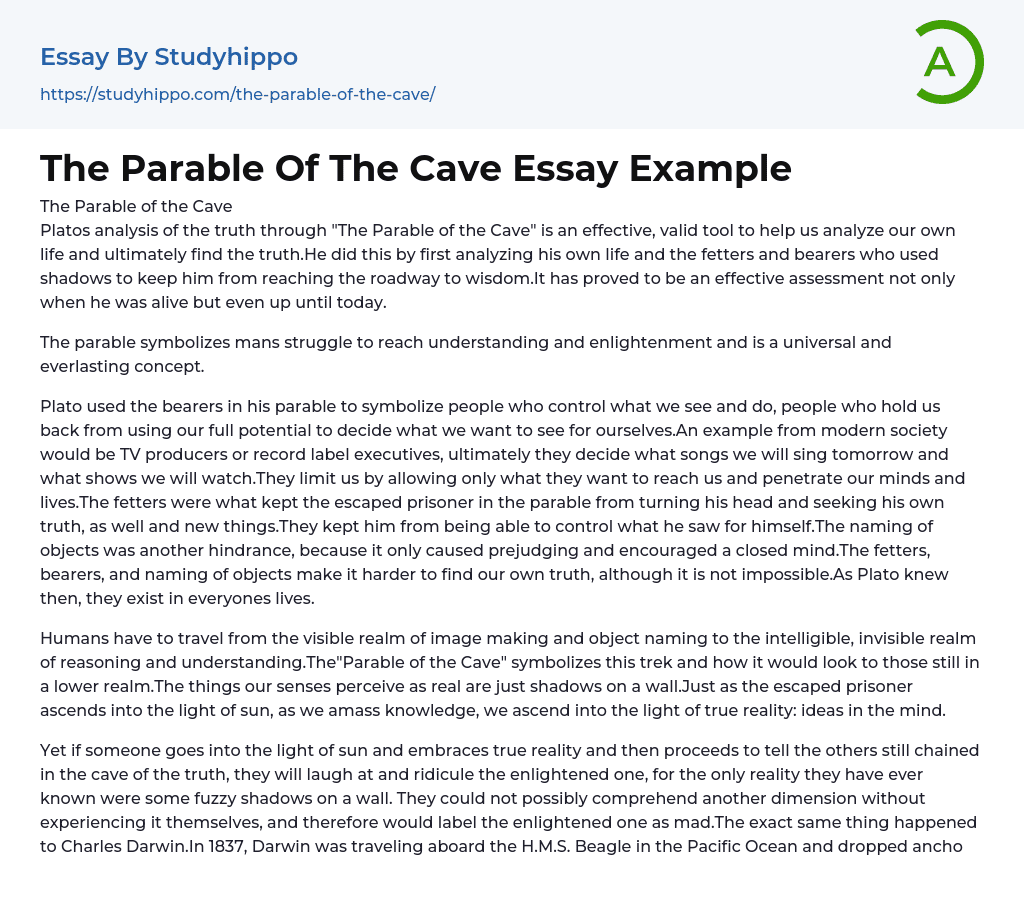Plato's "The Parable of the Cave" is still relevant today as a potent and legitimate means for self-reflection and uncovering truth. Through his personal experiences, Plato demonstrates how shadows can hinder our journey towards wisdom, serving as obstacles to enlightenment. This evaluation has endured through time and continues to hold significance in modern society.
The parable symbolizes the eternal and universal pursuit of knowledge and enlightenment by humanity.
Plato's parable used bearers as a representation of those in control, dictating our choices and obstructing us from reaching our full potential to determine our own experiences. In modern society, this can be seen through TV producers and record label executives who decide what songs we will sing and what shows we will watch. Their restriction limits us to only what they desire to influence and infiltrate o
...ur thoughts and lifestyles. Similar to the escaped prisoner in the parable, the fetters prevent us from turning our heads and seeking our own truth, as well as discovering new perspectives. By inhibiting our ability to control what we see, the fetters hinder us. Furthermore, the act of naming objects serves as another obstacle, leading to preconceived judgments and fostering a closed mind. Despite these hindrances, it is still possible to find our own truth. As Plato recognized, these influences exist in everyone's lives.
The journey of humans involves transitioning from the visible realm of creating images and naming objects to the intelligible, unseen realm of reasoning and comprehension. The "Parable of the Cave" illustrates this journey and how it appears to those remaining in a lower realm. The things our senses perceive as genuine are merely shadows cast on a wall. Similarly
as the prisoner who escapes ascends towards the sunlight, we elevate ourselves towards genuine reality by acquiring knowledge: ideas within our minds.
If someone steps into the sunlight and embraces true reality, then informs those still chained in the cave about the truth, they will face mockery and ridicule. These individuals can only understand the familiar dim shadows on the wall and are unable to grasp another dimension without experiencing it themselves. Therefore, they would label the enlightened person as insane.
Charles Darwin had a similar experience during his journey on the H.M.S. Beagle in 1837 when he reached the Galapagos Islands in the Pacific Ocean. There, Darwin encountered a diverse array of animals that compelled him to conduct research lasting until his death. Eventually, he published The Origin of Species in 1858, stating that these animals did not originate out of nothing but rather evolved from other species through natural selection and evolution.
This caused significant backlash as most people at that time adhered to Creationism theory. In this way, Darwin and his scientific followers resemble the escaped prisoner who saw true reality upon leaving the cave. However, when he shared his discoveries with the imprisoned population, he faced ridicule and was considered insane since they only knew distorted shadows on the wall without perceiving genuine reality.
Darwin followed a path towards understanding and wisdom similar to that of the allegory's escaped prisoner.
"The Parable of the Cave" is a timeless and ingeniously original text that will likely endure until the end of time. Its thought-provoking metaphors and unforgettable lessons continue to astound readers. Plato's parable prompts us to examine our own lives and ensure that we are not
solely relying on our senses, but rather seeking personal truths. Similar situations will likely arise in the future, echoing the lesson conveyed by Darwin's experiences.
- Age Of Enlightenment essays
- Ethos essays
- Time essays
- Acceptance essays
- Meaning Of Life essays
- Reality essays
- Natural Law essays
- Political Philosophy essays
- Utilitarianism essays
- Existence essays
- Free Will essays
- Good And Evil essays
- Confucianism essays
- Relativism essays
- Conscience essays
- Environmentalism essays
- Empiricism essays
- Epistemology essays
- Ethics essays
- Existentialism essays
- Human Nature essays
- Individualism essays
- Metaphysics essays
- Philosophy Of Life essays
- Transcendentalism essays
- Truth essays
- Destiny essays
- Determinism essays
- Fate essays
- Functionalism essays
- Philosophers essays
- Pragmatism essays
- Future essays
- Child Observation essays
- Critical Reflection essays
- Teaching Philosophy essays
- Personal Philosophy essays
- Action Speak Louder Than Words essays
- Can Money Buy Happiness essays
- Values of Life essays
- Ethical dilemma essays
- Normative Ethics essays
- Virtue Ethics essays
- Belief essays
- Deontology essays
- Moral essays
- Virtue essays
- Work Ethic essays
- Henry David Thoreau essays
- Carl Jung essays




